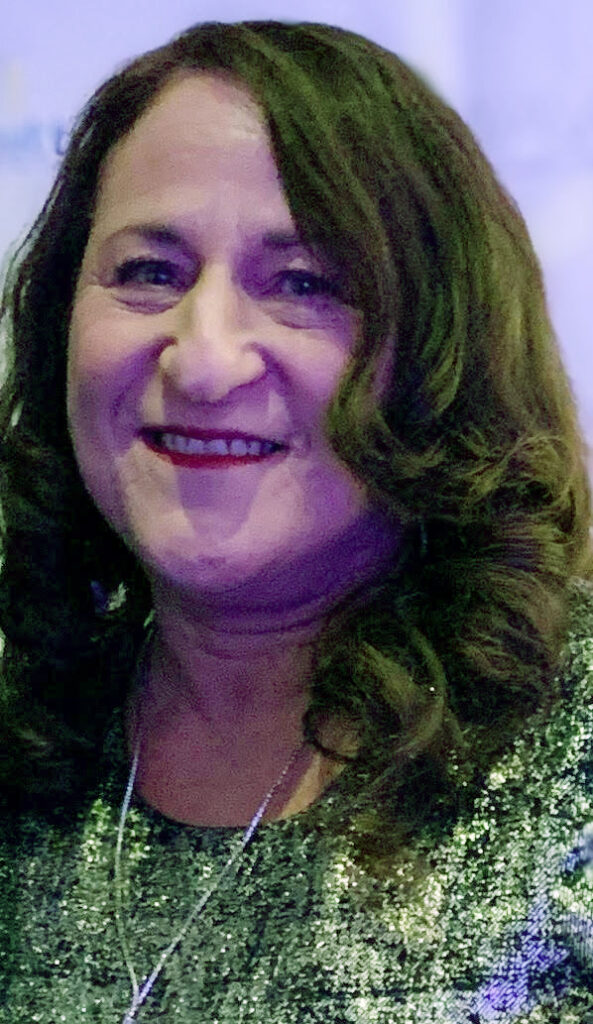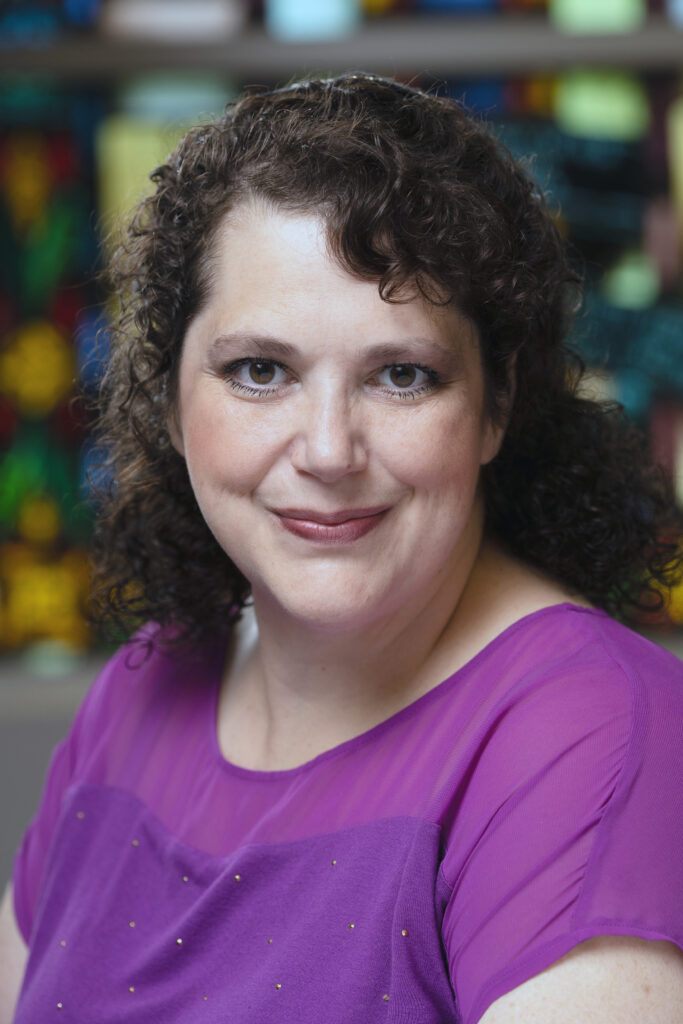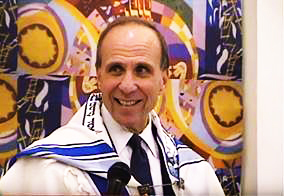
In July, Jewish congregations in communities throughout Connecticut welcomed new clergy to their midst. The Ledger is please to introduce this new group of rabbis and cantors.
By Stacey Dresner

IN DANBURY
Rabbi Rhonda Nebel
Congregation B’ani Israel
Rabbi Rhonda Nebel joined Congregation B’nai Israel in Danbury in July. She succeeds Rabbi Nelly Altenburger who is now senior rabbi at Congregation Adath Israel in Middletown. (See page 13)
A native of Mattapan, Massachusetts, Nebel says that her family was more culturally Jewish than religious.
“We were a Jewish family that didn’t keep kosher or Shabbat, per se. We would have bagels on Sundays, family get-togethers on the holidays. We went to synagogue with my grandparents, especially on the High Holidays.”
Still, she sure spent a lot of time in Hebrew School.
“We would go everyday Sunday [morning] through Thursday [after school]. And then we would go to Saturday morning junior congregation. I loved it!” she recalls. “I remember coming home from the first day of Hebrew school and I had learned the words Ema and Abba [mother and father] and I came home [calling out]– ‘Ema! Abba!’ It just sparked something in me.”
Her family moved to Stoughton, Massachusetts when Nebel was in seventh grade. There, she celebrated her bat mitzvah and confirmation, continued through high school her love affair with religious school, and was actively involved in USY.
“USY kept the fire alive,” she says. “By the time I was 15, I knew that it was being a rabbi for me. Because I always wanted to study psychology and I loved Hebrew school. So you put psychology and Judaism together, and you get rabbi!”
There was just one problem. At the time, there were no female rabbis in the Conservative movement.
In high school, Nebel could have graduated early, but decided to spend her senior year free periods studying Judaism.
“I arranged it with the high school, and told my rabbi that the high school would allow me to go to the temple to study in preparation for becoming a rabbi, even though it wasn’t exactly possible.”
Nebel began spending three days a week in the temple library,
reading and studying, and “checking in with the rabbi every so often.”
The rabbi recommended she look into Reconstructionist Judaism, which had female rabbis, but she says, that was not a good fit.
She attended Boston University where she majored in psychology and religion. After graduating, she went back home to Stoughton and became youth director at her old temple. In 1982, she married her husband, Robert, whom she had known since Hebrew school.
She soon was accepted and entered JTS’s graduate program for women “who wanted to study, get a PhD and then one day, when women could become a rabbi, go back and become ordained. So that was what I did.”
In 1984 while she was at JTS, the institution announced that they would start ordaining women. Nebel applied and was accepted to the rabbinical school and was in the first class of ordained female rabbis.
Ordained in 1990, she accepted a position as youth and education director at Congregation Beth El in New London.
“My youth group won chapter of the year three or four times. We were up for international chapter. I had a stellar Hebrew school. It was a wonderful experience,” she says.
After 10 years in New London, Nebel was ready to move on. Unable to find a rabbi educator position in a Hebrew school, which was her preference, she began to reevaluate.
“I was an education director, I was a youth director, and that was what I loved and what I was good at,” says says.
Still, the need to provide for her family led her to decide to seek a pulpit position. (Disabled since 1988, Nebel’s husband, a botanist and science teacher, has always been a stay-at-home dad for their daughter Samara, now 23.)
And so, in 2002, Nebel accepted a position at Temple Beth Chai in Hauppauge, New York.
“It turned out that the pulpit was not something that I was so bad at,” she laughs. “I found that I was actually good at all the other things that come with the rabbinate besides working with kids…that even though I can’t sing, people put up with my voice because they like the service. I am an out-of-the-box thinker, and I can come up with programming in my sleep. It was a love affair.”
Then, a little over a year ago, after 16 years at Temple Beth Chai, she decided to move on.
Unable to find a suitable position, Nebel says that for the first time in her life she began experiencing depression. And in February, she began feeling sick.
“There were three weeks when I didn’t feel well and couldn’t get out of bed,” she says. Ultimately, she tested positive for the Covid-19 antibody.
Now, she is looking forward to her role as spiritual leader of Congregation B’nai Israel.
“We used to call Beth Chai the ‘Little Shul in the Woods.’ This synagogue calls itself the ‘Little Shul that Could.’ And it’s true.
“I was looking for something that was haimish, that I could be a part of congregant’s lives. I make personal relationships with everyone. My mother always called me a ‘people collector.’ I just love people, I love helping people and I love hearing people’s stories.”

IN GREENWICH
Cantor Michelle Rubin
Greenwich Reform Synagogue
Cantor Michelle Rubin joined Greenwich Reform Synagogue as cantor and Hebrew school director on July 1.
In her new role, her goal is to ensure that the religious school experience of students is outstanding — something, she says, that her Hebrew school days were not.
“I didn’t have the best experience,” she explains.“That is why it is so important to me to make sure that I help provide our students with a positive and meaningful Jewish education experience, unlike my own. Over the years, I have heard so many parents describe their Jewish education in the most negative ways and then thank me for providing their children with a very different experience and I am truly grateful to have the opportunity to do so.”
A native of suburban Philadelphia, Rubin grew up in attending a Reform congregation despite the fact that her father was an agnostic and her mother was an atheist.
“On the High Holidays my parents didn’t go [to synagogue], but I would go with my friend Jennifer. My parents were very good friends with the rabbi, but just not religious. They thought it was the right thing to be a part of the community,” she says. “And I was always interested. I loved the music and I loved the community. I loved just learning about Judaism.”
Rubin, who had been giving music lessons since high school, considered going into psychology, but music was her first love.
She earned a Bachelor of Music in Opera from the University of Hartford’s Hartt School of Music, and two Master of Music degrees in Vocal Performance and Vocal Pedagogy from the New England Conservatory.
A pivotal moment occurred when a friend asked if she wanted to go to Harvard Hillel so that they could introduce her to a friend.
“I was always up for meeting new guys, but I had never heard of Hillel,” she laughs. “The guy was not a match, but I was hooked and I became very active in the community…and in the Reform minyan and then the Conservative minyan.
“I loved the music, the community, celebrating Shabbat. It was very impactful for me,” she says.
Then one Friday night, Rubin had an epiphany.
“I was in Hartt’s select choir and I had a solo which was huge,” she recalls. “But it was on a Friday night and I remember thinking, ‘Oh man, I don’t get to go to services tonight.’ That’s when I had my a-ha moment, when I would rather be observing Shabbat and being with my community than have this huge solo.”
She began reevaluating her career – and decided to switch gears and become a cantor.”
She went on to study Judaism at Hebrew College and immersed herself in Judaism through the Boston Jewish community. She continued to attend Harvard Hillel, and became Shomer Shabbat – Sabbath observant. She worked in a Jewish day care center, served as a Jewish youth group leader and taught music.
Eventually, she was invested in the Jewish Theological Seminary’s H.L. Miller Cantorial School, from which she received a Master of Sacred Music and a diploma of Hazzan in 1999.
Previously, she served for nine years as cantor at Temple Israel in Ridgewood, New Jersey, and for 12 years as cantor and education director at Montbello Jewish Center in Suffern, New York.
She came to Danbury looking for a change.
“I really wanted to ideally be cantor/educator…I didn’t want to give up either of them,” she says. But the position GRS advertised for was education director.
When Rubin interviewed at GRS, she was struck by their “warmth and understanding. She thought, “I love these people.”
“When I came in for the bigger interview, they asked, ‘Would you consider doing a cantor/educator position again?’ They offered me both positions and it really was a dream come true.”
“We are a small congregation, around 110 or 115 familes,” says Ken Greenberg, co-president of GRS and a member of the search committee that hired Cantor Rubin. “We had a part-time cantor and a part-time educator for a number of years and one of the things we have talked about forever was, wouldn’t it make sense if we could find the right person to combine the positions…It seemed like there could be a lot of synergy there.”
But, recalls Greenberg, “A member of our committee said ‘You guys are looking for a unicorn. He said, ‘Yes, there are people who do both, but to get someone to do both very well you will be incredibly lucky.”
And so they decided to conduct a search for an educator only. That’s when Rubin walked through the door.
“We did the interview for her as an educator,” he says. “But when she walked in we thought she was a person we could get to do both — she had a beautiful voice, she had the educator experience…and she just wowed us. She was willing to take on both positions, and so far it is working out great. She is the unicorn!”
Besides serving as running the religious school, Rubin had a hand in building and strengthening USY at her last congregation, and hopes to help GRS’s youth group grow and thrive as well.
For now, she has spent the past few months during the pandemic getting to know her congregants.
“The families are wonderful and receptive,” she says. “I think we are all just excited.”

IN NEW LONDON
Rabbi Earl Kideckel
Congregation Beth El
Rabbi Earl Kideckel joined Congregation Beth El in New London on July 1, succeeding Rabbi Rachel Safman, who is now spiritual leader of Temple Beth-El in Ithaca, New York.
Kideckel and his wife Lisa moved to Mystic from the Boston area in May. He hopes to build upon the successes of his predecessors, Safman as well as her predecessor, Rabbi Carl Astor.
“Beth El is a wonderful congregation.The individuals who are involved in this community who I have met already really understand Jewish life; really understand community.”
Kideckel says he knew he wanted to be a rabbi at a fairly early age.
“I grew up in a family that was very oriented to synagogue life,” says the Toronto native. “My father was the president of a major congregation [Beth Emeth Bais Yehuda] which he helped build from about 100 families to somewhere around 1,600/ 1,800 families. My mother was the sisterhood president. I went to Jewish day school my entire life – to Associated Hebrew Schools and then the Community Hebrew Academy of Toronto. My sister was a Schechter principal in LA for 29 years. So, synagogue life, Jewish life, is a part of who we are.
“My parents had us involved in Jewish life right from the beginning. We always had Shabbat dinner. Shul was very important to our family. When I was growing up, every Shabbos morning I was either at shul or I went to the junior congregation at my Jewish day school. I was involved in USY; I was vice president of the region.”
It’s no wonder then that, while still in high school, Kideckel told his parents that he wanted to be a rabbi.
“My father’s next reaction was to have me meet with as many rabbis as he could – Reform, Conservative and Orthodox – to let me know that it wasn’t a job for a good Jewish boy. After listening to all of them and deciding that I still wanted to go down to the seminary, my parents made it happen.”
Kideckel graduated with bachelors degrees from the joint program of the Jewish Theological Seminary and Columbia University and was ordained by JTS. He served as a rabbi in New York, at pulpits in Elmira and Long Island, and at the Israel Community Center of Levittown. He spent three years at a shul in Las Vegas, and then the next 25 years in the Boston area. His last full-time position was Temple Beth Torah in Holliston, Massachusetts, where he spent 16 years before he “semi-retired.”
Since then, he has served the Jewish community of Boston as a rabbi to the unaffiliated, providing counseling and life-cycle services including bar/bat mitzvah ceremonies, baby namings, weddings and funerals.
But as it turns out, he was not really ready to retire.
“Two years ago I took a holiday pulpit at Beth Shalom Congregation in Alberta. My wife, Lisa, saw me on the pulpit and realized I was missing something in my life, and that was working with people, teaching people, and being inspired by what I was doing.”
When they got back home, he had a family meeting with his wife and their three adult children.
“They all looked at me and said, ‘Dad you need to go back and do what you love to do.’”
He contacted the rabbinical placement organization of the United Synagogues of Conservative Judaism and when the position at Beth El in New London became available, he and Lisa travelled to the area for a Shabbat.
“I realized, and my wife realized, that it’s a wonderful group of people,” Kideckel said. “They had two wonderful rabbis before me, Rabbi Carl Astor for 38 years, and Rabbi Rachel Safman for seven, and it was time for them to find a rabbi who could guide them, help them, and work together with them in taking the next steps in ensuring the future of Conservative Judaism in southeast Connecticut.”
He understands the challenges.
One is Beth El’s lack of a permanent home – their synagogue building was sold a few years back and services are held in a local church building.
Another is demographics.
“Just like every other community in America, there is less attendance at synagogue events, there are fewer people joining congregations,” he says. “The goal is to make everyone understand and realize how important it is to have a Conservative-based congregation in the area.”
For now, Kideckel has been busy reaching out to the community – calling many on the phone to introduce himself and meeting them in person through socially distanced means.
“We are doing something we call ‘Coffee without Coffee With the Rabbi.’ I have literally met more than 100 individuals already in settings like backyards of people homes, or one-on-one in parks. I’ve reached out to them both in challenging moments and in moments of celebration.”
“We are just so fortunate to have him,” said Kathleen McFadden, president of Congregation Beth El. “He is such an experienced rabbi and he has a beautiful voice and he conducts services so beautifully. He just has a tremendous amount of experience and knows how to deal with congregants and work with the board. He’s been an absolute pleasure to work with.
“We’re in a whole new era with Covid, and he’s been flexible in his approach, because you have to think about how to do Shabbat services and how to do High Holiday services, and he has been incredibly thoughtful and flexible, changing things up if we have to change it up. He’s been great.”
Main photo by Tomertu, Getty Images/iStockphoto.







 Southern New England Jewish Ledger
Southern New England Jewish Ledger













